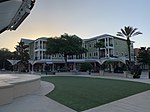Dudley Farm Historic State Park
2002 establishments in FloridaFarm museums in FloridaFarms on the National Register of Historic Places in FloridaMuseums in Alachua County, FloridaNational Historic Landmarks in Florida ... and 7 more
National Register of Historic Places in Alachua County, FloridaOpen-air museums in FloridaParks in Alachua County, FloridaParks on the National Register of Historic Places in FloridaProtected areas established in 2002State parks of FloridaUse mdy dates from August 2023

Dudley Farm Historic State Park (Florida), also known as Dudley Farm, is a U.S. historic district and museum park located in Newberry, Florida. It was added to the U.S. National Register of Historic Places on October 4, 2002, and was designated a National Historic Landmark in January, 2021. The address is 18730 West Newberry Road (Florida State Road 26). The farm is a particularly fine and well-preserved example of a mid-19th to mid-20th century farm.
Excerpt from the Wikipedia article Dudley Farm Historic State Park (License: CC BY-SA 3.0, Authors, Images).Dudley Farm Historic State Park
Newberry Road,
Geographical coordinates (GPS) Address Nearby Places Show on map
Geographical coordinates (GPS)
| Latitude | Longitude |
|---|---|
| N 29.654166666667 ° | E -82.543611111111 ° |
Address
Newberry Road 19529
32669
Florida, United States
Open on Google Maps







